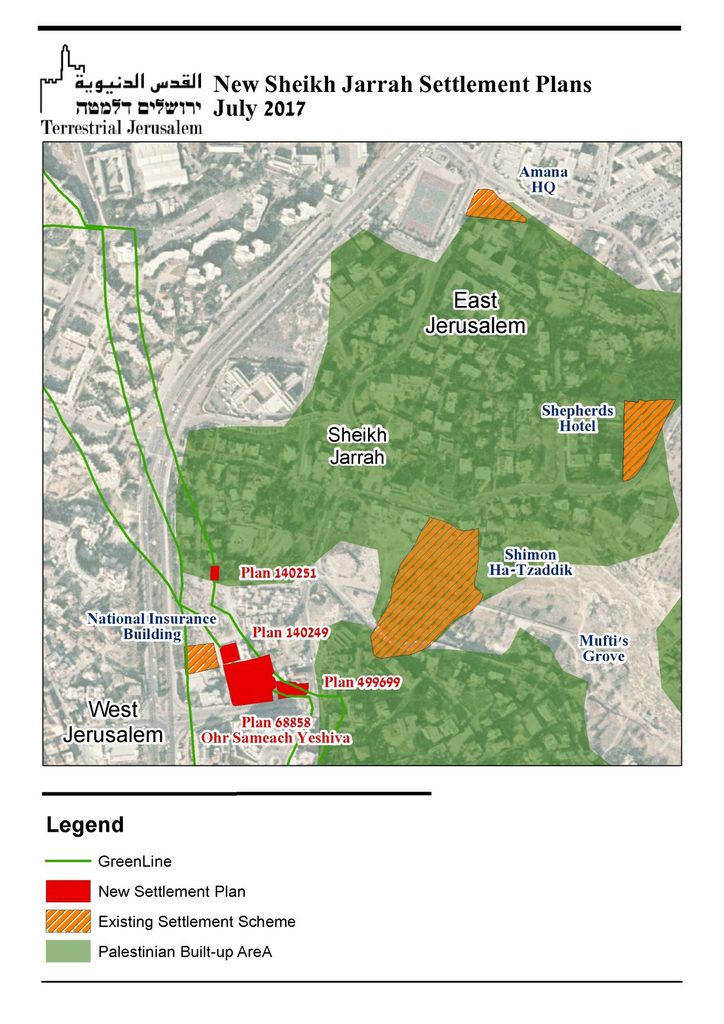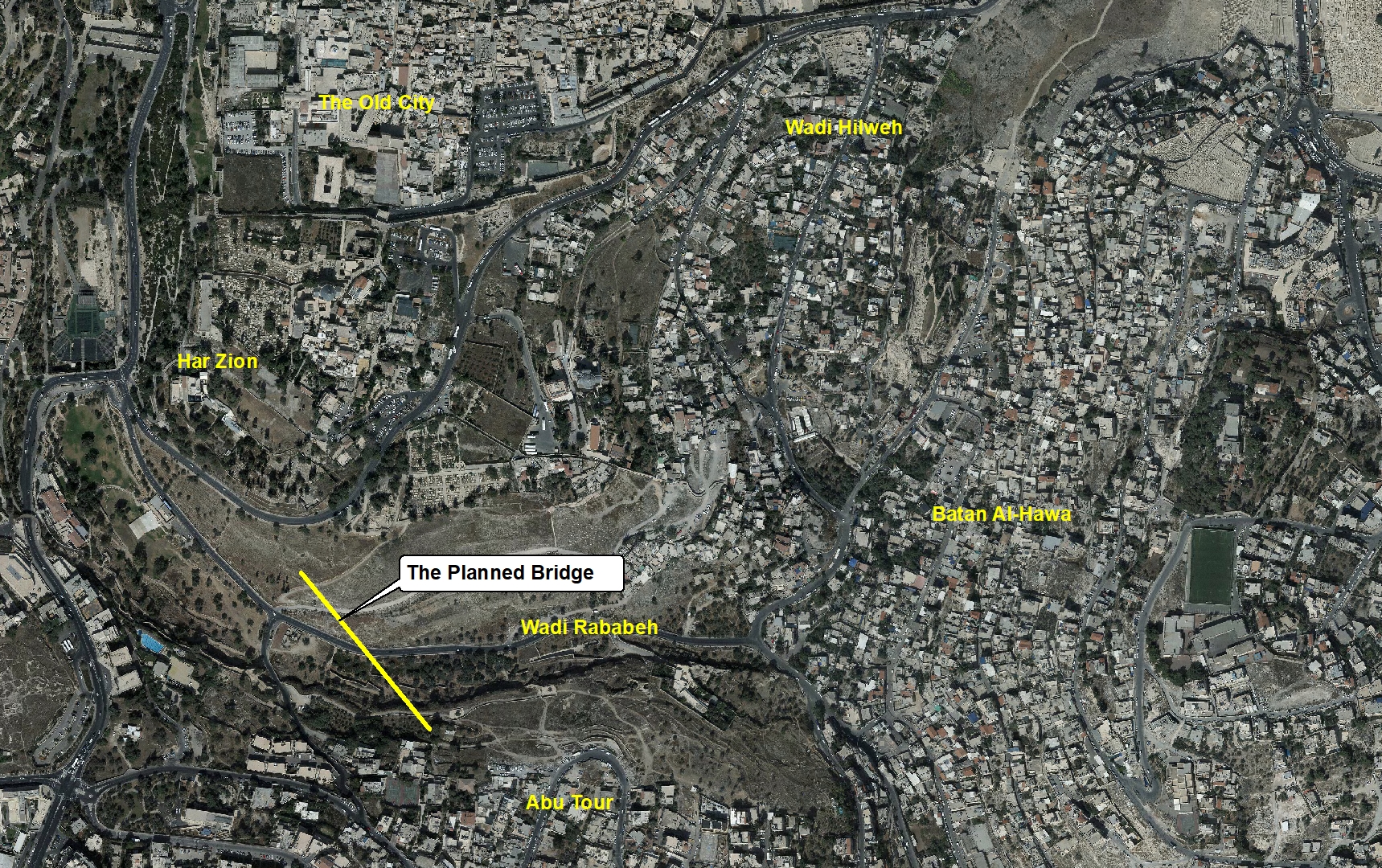Welcome to FMEP’s Weekly Settlement Report, covering everything you need to know about Israeli settlement activity this week.
To receive this report via email, please click here.
May 3, 2018
- Forging Ahead with Another Settler Project at Entrance of Sheikh Jarrah
- Israeli NGOs File Challenge Against Settler Footbridge Near Old City
- Kerem Navot Report: Some of Israel’s West Bank Police Stations are on Private Palestinian Land
- Update: High Court Override Legislation is in Limbo
- Bonus Reads
Comments, questions, or suggestions? Email Kristin McCarthy at kmccarthy@fmep.org.
Forging Ahead with Another Settler Project at Entrance of Sheikh Jarrah
On April 26th, the Jerusalem District Planning and Building Committee advanced a plan, backed by settlers, to build a 6-story commercial building at the entrance of the Palestinian East Jerusalem neighborhood of Sheikh Jarrah – taking the key step of depositing the plan for public review. The building will be across the street from one of the most provocative settlement projects that were advanced last year: a new religious school (the Or Sameach Yeshiva/Glassman Complex) described by Terrestrial Jerusalem to be:
“a clear effort to exploit Torah study to expand and normalize occupation in East Jerusalem (including by making the site politically untouchable, as it will now be linked with religious activities).”
The location of the yeshiva and the 6-story building (which, once built, will literally flank both sides of the road leading into Sheikh Jarrah) will strengthen Israeli settlers’ hold on the neighborhood. Together they will advance the settlers’ goal of cementing the presence of the settlement enclaves inside of Sheikh Jarrah by connecting them more seamlessly to the neighborhood’s outer periphery and the rest of Jerusalem.
Sheikh Jarrah and its Palestinian residents are the target of intense settler activity, which FMEP has covered repeatedly in the past.
Israeli NGOs File Challenge Against Settler Footbridge Near Old City
The petitioners argue:
“The proposed bridge is located in one of the most sensitive and significant areas in Jerusalem and one of the most important in the world. The Old City basin is one of Jerusalem’s most precious cultural, religious and historical assets, as well as politically significant. Construction and development in this area should be done in a careful and considerate way, in a meaningful public debate and in the context of a true planning vision.
It is not without reason that the designs were set in the planned area. . . [an area] whose main purpose is to preserve and protect the Old City basin from rapid development and construction initiatives that might damage the important values in this special area. These plans do not allow the issuance of permits for such a significant construction and do not allow expropriation at all without proper documentation, and they explicitly state the need for detailed planning with the approval of the District Committee.
It is important to note that in addition to the familiar tension between development and tourism needs and the principles of conservation and protection of historical and environmental values, the Old City basin is also an urban area with a population of tens of thousands of people who live alongside and sometimes within historic sites. The bridge and pedestrian traffic will have significant implications for the area and its character for the residents living in the area.
For all these reasons, extreme caution is required in approving development plans in the Old City basin. The permit in question was approved in violation of all the proper planning and public principles, and therefore there is a need to cancel it.”
Peace Now reports that Elad has already started building infrastructure for the footbridge in Abu Tor, despite lacking a building permit (the plan was approved, but permits have not been issued). Peace Now appealed to the Jerusalem Municipality to have the construction stopped; the Municipality responded saying the construction does not relate to the bridge but to a permit that was issued for the “restoration of terraces” on the same land. Peace Now appealed again two weeks ago, arguing that Elad’s current undertakings – which include building walls, pouring of concrete, and excavating – require an additional permit (how it is being argued that those projects relate to the “restoration of terraces” is unclear). The Municipality has not yet responded.
As FMEP has covered many times in the past, Elad’s mission is to establish Jewish hegemony in Jerusalem, and it often uses tourism as a pretext for its activities in Jerusalem’s most contested neighborhoods. Kerem Navot says the Abu Ror footbridge is part of Elad’s efforts to take control of areas surrounding the neighborhood of Silwan.
Kerem Navot Report: Some of Israel’s West Bank Police Stations are on Private Palestinian Land
New research published by the anti-settlement watchdog Kerem Navot documents the legal status of land in the West Bank on which 38 Israeli police stations have been built, and reveal that four stations are built illegally on privately-owned Palestinian land.
The report reveals that of the 38 police stations in the occupied territories:
- 17 stations are on land declared by Israel to be “state land”
- 8 stations are on land Israel seized for “security purposes”
- 2 stations are on land expropriated for “public purposes”
- 1 station (servicing the Givat Ze’ev settlement) is fully on privately-owned Palestinian land
- 1 station (servicing the Ma’ale Adumim settlement) is partially on privately-owned Palestinian land, and partially on land that was seized from the Palestinian owners for “public purposes”
- 1 station (servicing the Elkana settlement) is partially on privately-owned Palestinian land and partially on land seized from Palestinian owners for “security purposes”
- 1 station (servicing the Vered Yeriho settlement) is partially on privately-owned Palestinian land and partially on land that was declared “state land”
Kerem Navot writes:
“As is well known, there are two communities in the West Bank, each of which has completely different rights, and previous reports have been devoted to describing the Israeli Police’s failure to enforce the law in cases of settler violence in a sense reminiscent of values of equality. This modest document will not address this fundamental ethical issue… this report solely seeks to address the geographical-statutory aspect of the deployment of Israel Police stations throughout the West Bank…The initial idea for addressing this aspect arose when, over the course of our research in recent years, we incidentally discovered that several police stations in the West Bank are illegally located on private Palestinian-owned land. There is no need to elaborate on the paradoxical severity of this fact.”
Update: High Court Override Legislation is in Limbo
It appears that the Israeli Knesset, which convened this week for the summer session, will not take immediate action on a bill to empower the Knesset to reinstate laws struck down by the High Court of Justice (reminder: the High Court is expected to strike down the Regulation Law, and MKs have already stated their desire to make sure it remains on the books). Prime Minister Netanyahu (Likud) and Justice Minister Ayelet Shaked (Jewish Home) were not able to reach a compromise on the specifics of the bill during a meeting with Chief Justice Esther Hayut last weekend, and no news of the bill has surfaced since. It is unclear if Naftali Bennett (Jewish Home) intends to follow through on the threat he made last week to call for elections if Netanyahu does not advance his version of the bill – which will allow the Knesset to reinstate laws with a bare-bones, 61-vote majority in the Knesset – this week.
While political leaders debate amongst themselves, a new public opinion poll found that 65% of Israelis believe that the version of the bill pushed by Ayelet Shaked and Jewish Home party leaders would “grant the government ‘unlimited’ and unchecked power.” 58% of the public said they believed the law would lead to more corruption.
Bonus Reads
- “Settler Rail Line to Israel Latest Land Grab, Palestinians Say” (Al Jazeera)
- “Thirteen Cases of Vandalism, One Arrest: Who is Behind the Wave of West Bank Hate Crimes?” (Haaretz)
- “‘Price tag’ hate crimes against Palestinian on the rise in Israel and West Bank” (NBC News)
- “Christians in Jerusalem’s Old City ‘under threat’ from settlers” (The Guardian)
